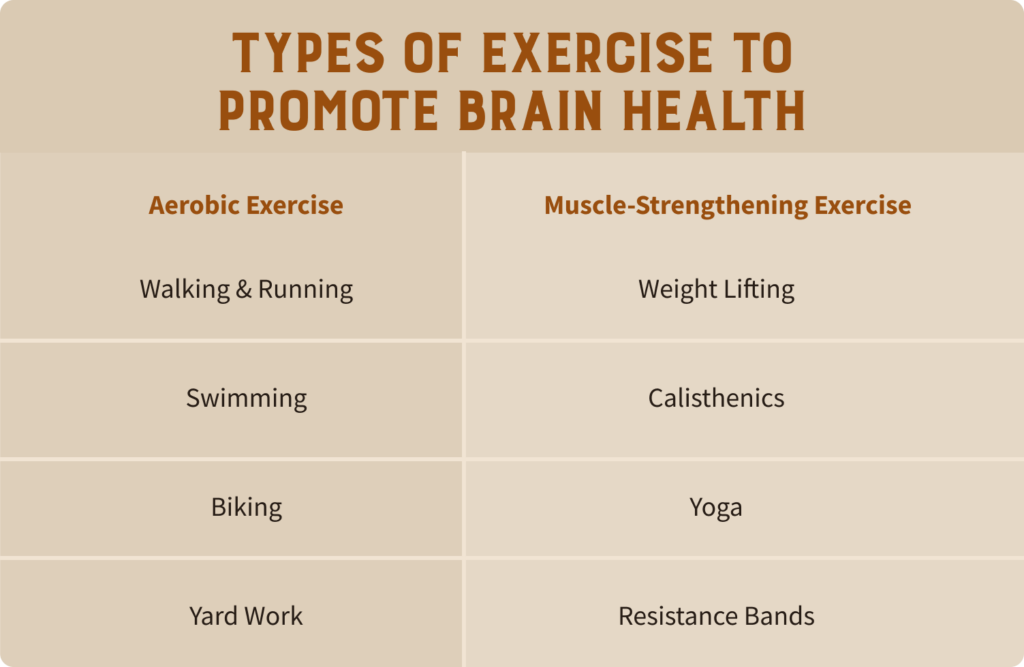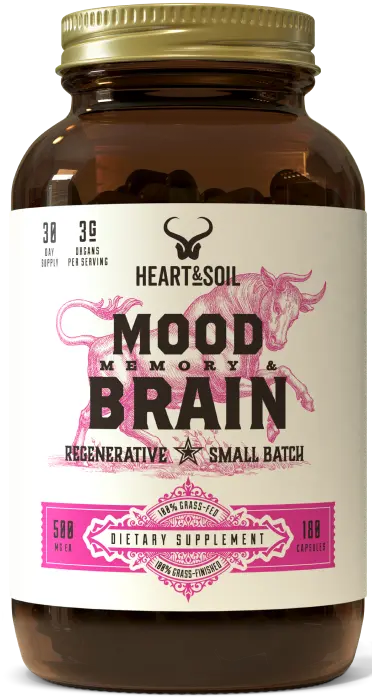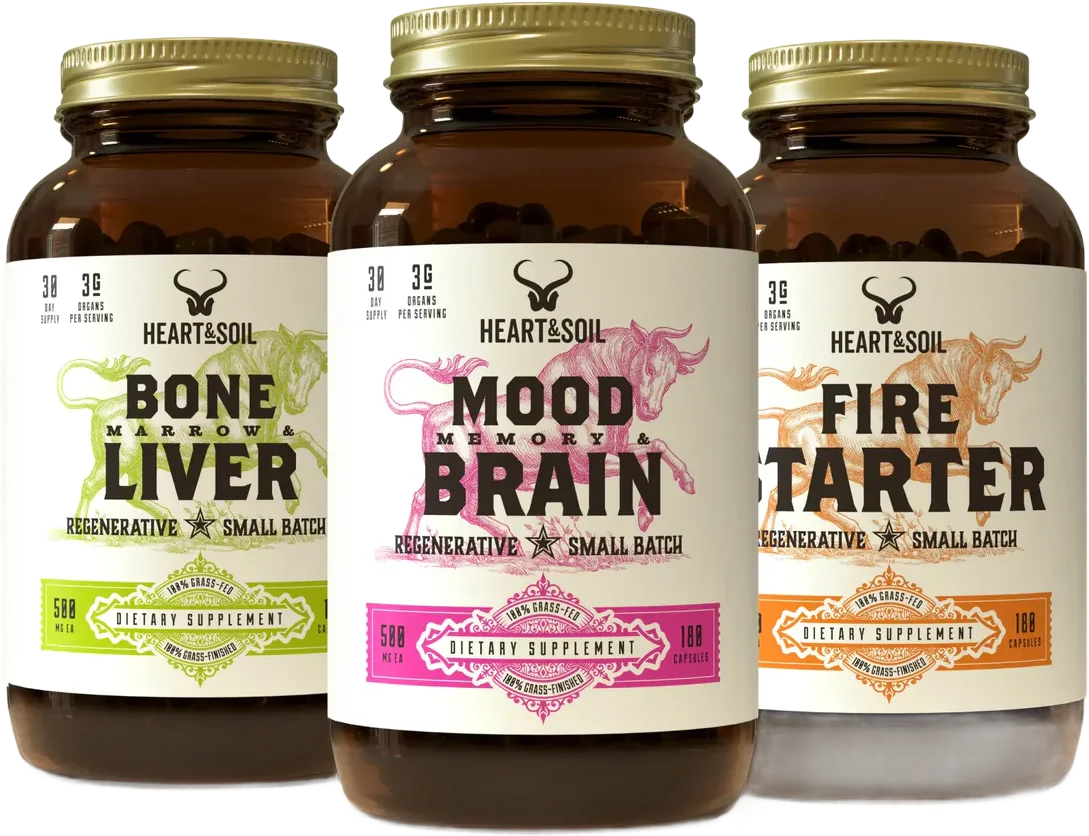PLEASE NOTE: The information in this blog is for educational purposes only. It is not a substitute for professional medical advice. Consult your healthcare provider if you’re seeking medical advice, diagnosis, or treatment.
To put it mildly, brain and mental health are struggling massively in the modern world.

Nearly 1 billion people around the globe are dealing with mental health problems (1). By 2050, over 131 million people are projected to be diagnosed with dementia, and it is responsible for almost 29 million life years of disability per year (2, 3). Some estimates even claim that the yearly cost to care for Alzheimer’s patients is over $159 billion (4).
What has gone wrong to cause our shocking mental health epidemic?
In this article, we’ll explore the answer to this question, discover brain foods for better mood and memory, and find out the best lifestyle tips to support your brain.
Let’s take a look!
What Your Brain Needs to Be Healthy
The brain requires an immense amount of energy and is responsible for thoughts, emotions, movement, memory, and more (5). From infancy and late into adulthood, the brain requires oxygen and nutrients from healthy foods.
Given the emphasis on brain foods, we’ll focus specifically on macronutrients (protein, fat, and carbs), vitamins, and minerals.
Macronutrients
Protein, fat, and carbohydrates offer the tools needed for proper brain function (6).
Protein, in particular, is incredibly important for brain health as it can boost memory and improve executive function (7). Not getting enough protein can lead to issues related to motivation, learning, and motor control (8).
Vitamins
Vitamins and minerals (called micronutrients) are also needed for brain development and function (9).
Vitamin A can improve cognition and is being explored for the prevention and treatment of Alzheimer’s (10, 11). Despite being an essential nutrient, it is one of the most common deficiencies globally (12).
The eight B vitamins are crucial for brain function and can protect it from damage (13, 14). Deficiency in vitamin B6, B9, or B12 may result in symptoms of dementia or depression (15, 16).
Vitamin D is important from a young age for brain development and also helps adults maintain cognitive function (17). Vitamin D can even improve sleep (18). As we’ll see shortly, restful sleep is a critical part of brain health. Deficiency in vitamin D is associated with Alzheimers disease, depression, and schizophrenia (19).
Emerging evidence also shows that vitamin K is vital for brain function (20, 21).
Minerals
Ensuring you have the proper intake of minerals is another non-negotiable for brain health. Here are some of the most important minerals to consider:
- Iron: helps move oxygen to the brain and contributes to brain development (22, 23).
- Zinc: this mineral is one of the most important minerals as it affects memory, cognition, and emotions (24, 25)
- Calcium & Selenium: both can act as antiinflammatory agents, protecting the brain from damage (26).
- Magnesium: deficiency of magnesium is connected to inflammation in the brain (27).
- Iodine: during pregnancy, iodine is essential for brain development (28, 29).
- Choline: essential for brain function and development (30, 31).
The best way to ensure you get these macro and micronutrients is often through a healthy diet.
7 Powerful Brain Foods: What Are the Best Choices?
If you’re wondering where you should get these macronutrients, vitamins, and minerals from, nature provides us with an abundance of brain foods. These are 7 powerful options:
1. Meat
Humans and our ancestors have been consuming meat for millions of years (32). Although it’s often criticized, the World Health Organization even admits that animal foods are some of the most nutrient rich foods for children (33).

Beef and other meat products can provide large amounts of vitamin B12, zinc, choline, and other nutrients that can support cognitive development (34). Adding high-quality meat to your diet can be a great way to obtain the nutrients your brain needs most.
2. Organ Meats
Another powerful, but overlooked animal product is organ meats such as beef liver. Organ meats, and especially beef liver, are a potent source of vitamin A, zinc, selenium, iron, and other important nutrients (35).
Mood, Memory & Brain even incorporates bovine brain alongside beef liver and bone marrow. It’s a popular choice for those looking to improve their mental clarity, focus, and brain power.
Mood, Memory & Brain
Calm & Clarity with Grass-Fed Organs
3. Fish & Seafood
Given the major presence of omega 3 fatty acids and other beneficial nutrients, fatty fish and seafood can be some of the best brain boosting foods (36). The omega-3s in fish are beneficial for brain growth and maintenance (37).
Diets high in omega-3 can also lead to higher levels of brain derived neurotrophic factor (BDNF), which is a molecule with neuroprotective properties (38, 39).
4. Dairy Products

Dairy products are a great source of protein, B vitamins, calcium, iron, choline, and other brain-supporting nutrients (40, 41, 42). Consider adding milk, yogurt, kefir, butter, or cottage cheese into your routine.
5. Eggs
Just two eggs per day can satisfy 10-30% of human vitamin requirements (43). Eggs even contain all vitamins (except for vitamin C). Eggs are also one of the few natural food sources of vitamin D (44).
Two ingredients in eggs, lecithin and choline, can help form neurotransmitters known to improve memory (45).
6. Fruits & Veggies

The polyphenols in fruit, veggies, tea, and coffee are neuroprotective and may support healthy brain function (46, 47).
7. Fermented Foods
Fermented foods have also emerged as a way to protect the brain and slow cognitive decline (48, 49). Fermented dairy products like kefir may also offer cognitive benefits and reduce the risk of dementia (50).
6 Lifestyle Tips for Better Brain Health
Incorporating the right brain foods into your diet can significantly impact your health, but the significance of healthy lifestyle choices should not be underestimated. Six habits in particular can have a massive impact on your mood, memory, and cognitive health.
1. Exercise
Exercise is known to promote brain health and may even help fend off brain aging, yet only 30% of the US population gets more than 30 minutes of physical activity each day (51, 52).
Physical activity can also assist in reducing anxiety, depression, Alzhemiers, and dementia (53). It’s also been shown to improve academic function in children, and improve memory and processing speed for adults (54).

Various forms of exercise such as strength training, aerobic training, and mind-body exercises are supported by scientific research (55, 56, 57).
2. Sunlight
Sunlight exposure is connected to improved mental and physical health (58, 59). Even 10-15 minutes of sunshine can lead to better energy and boost your mood.
3. Sleep
Proper sleep is crucial for memory, learning, and brain development (60). The brain removes waste, recharges, and reorganizes itself during sleep (61).

Despite its importance, only about 50% of the population gets the recommended 7 hours of sleep each night (62). This lack of sleep can impair brain function, mood, motor function, and behavior (63, 64).
Helpful sleep habits include sleeping in a cool and dark environment, limiting tech usage before bed, having a consistent bedtime, and avoiding alcohol and caffeine (65).
4. Stress Reduction
Stress is another well known determinant of brain health. Chronic stress can have a negative impact on mood regulation, learning, memory, and mental health (66, 67).
Engaging in stress reduction techniques can be a valuable tool for your brain health. Helpful techniques include prioritizing sleep, exercising, taking walks in nature, and disconnecting from your devices.
5. Connection

Social connection and relationships are another important component of brain health. Meaningful connections help you foster a sense of community and well-being, while social isolation is associated with obesity and altered eating habits (68, 69).
6. Smart Tech Usage
It’s difficult to break free of modern technology when you’re constantly surrounded by phones, TVs, computers and other gadgets. Some estimates claim that people spend the equivalent of 100 days online per year (70).
Unsurprisingly, this tech usage can negatively impact behavior, sleep quality, and brain function (71). So, getting away from your devices can be a simple way to improve your brain health.
Improve Your Brain Health and Thrive!
Like so many other areas of human health, brain health has taken a nosedive. We’re now seeing massive increases in Alzheimer’s, dementia, depression, and anxiety. The good news is that you can fight back against these challenges.
With a healthy diet made up of real food, you can give your brain the necessary nutrients to leave you feeling energized, alert, and mentally sharp. Plus, you can see even more improvements when you focus on habits such as proper sleep, regular exercise, and limiting stress.
Mood Stack
Elevate Your Mood, Sharpen Your Mind
Subscribe to future articles like this:

